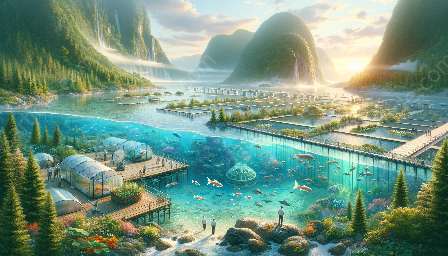Water resource engineering is a multidisciplinary field that encompasses the study, design, and management of water resources. It plays a crucial role in providing sustainable solutions for water-related issues and supporting various sectors within applied sciences.
The Fundamentals of Water Resource Engineering
Water resource engineering focuses on the understanding, analysis, and utilization of water sources, such as rivers, lakes, and groundwater. By investigating the hydrological cycle, engineers can determine the availability and quality of water, as well as identify potential risks associated with flooding, drought, and pollution.
Hydrology: Understanding the Water Cycle
Hydrology is a fundamental aspect of water resource engineering. It involves studying the movement, distribution, and quality of water on Earth. Through hydrological analysis, engineers can assess the impact of precipitation, evaporation, and runoff on water availability, enabling them to develop strategies for sustainable water management.
Water Infrastructure and Management
Effective water infrastructure is essential for delivering clean water to communities, supporting irrigation for agriculture, and managing wastewater. Water resource engineers design and maintain infrastructure such as dams, reservoirs, and water treatment plants, ensuring the efficient supply and distribution of water resources for various purposes.
Sustainable Water Management
As the demand for water continues to rise, sustainable water management practices are crucial for conserving resources and protecting the environment. Water resource engineering plays a vital role in developing innovative solutions for water conservation, recycling, and pollution control, contributing to the advancement of applied sciences.
Integrated Water Resource Management
Integrated water resource management involves considering the complex interactions between water, ecosystems, and society. Water resource engineers collaborate with environmental scientists, policymakers, and local communities to develop comprehensive strategies that promote efficient water use, protect natural habitats, and mitigate the impacts of climate change.
Emerging Technologies and Research
The field of water resource engineering continues to evolve through the adoption of advanced technologies and ongoing research. Innovations such as remote sensing, geographic information systems (GIS), and computational modeling enhance the understanding of water systems and facilitate the development of sustainable solutions for water resource management challenges.
Applications in Applied Sciences
Water resource engineering has far-reaching implications for various disciplines within applied sciences, including environmental science, civil engineering, and agricultural technology. By integrating the principles of water resource engineering, researchers and practitioners can address complex environmental concerns, enhance infrastructure resilience, and promote the responsible use of water resources.
Environmental Sustainability and Conservation
Through the application of water resource engineering principles, applied sciences contribute to environmental sustainability and conservation efforts. Engineers and scientists collaborate on projects aimed at safeguarding ecosystems, restoring natural water flows, and preserving biodiversity, aligning with the broader goal of creating a harmonious balance between human activities and the natural environment.
Infrastructure Development and Resilience
Water resource engineering has a direct impact on infrastructure development and resilience within applied sciences. By implementing innovative water management practices and infrastructure designs, engineers and planners can enhance the resilience of urban areas, agricultural systems, and industrial facilities against water-related risks, ultimately contributing to the sustainable development of societies.
Technology Integration and Data Analytics
Advancements in technology and data analytics offer significant opportunities for applied sciences to leverage water resource engineering methodologies. By harnessing the power of real-time monitoring, data-driven decision-making, and predictive modeling, researchers and practitioners can optimize water resource utilization, assess environmental impacts, and enhance the overall efficiency of water-related systems.







































